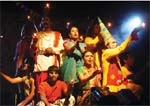Ganga Jamuna Theatre Fest
Two classics, a contemporary play to be staged
 On the third day of the ongoing Ganga Jamuna Theatre Festival, two classics and a contemporary play will be staged at the three theatre halls of
On the third day of the ongoing Ganga Jamuna Theatre Festival, two classics and a contemporary play will be staged at the three theatre halls of
Bangladesh Shilpakala Academy today.
Loko Natyadol will stage Kanjush at the National Theatre Hall, Chittagong based troupe Teerjok Natydol will stage Raktakarabi at the Experimental Theatre Hall and Prachyanat will stage Kinu Kaharer Thetar at the Studio Theatre Hall.
Loko Natyadol’s Kanjush, adapted by Tariq Anam Khan from Moliere’s classic ‘The Miser’, has the record of largest number of shows of over times in the country.
Directed by Liaquat Ali Lucky, Kanjush features a funny story of a miser named Haider Ali Khan. The production has numerous amusing and comic elements punched into the play through the local Dhakaiya dialect and the hilarious central character.
On the other hand Rabindranath Tagore’s classic Raktakarabi has been directed by Ahmed Iqbal Haider of Teerjok Natyadol.
Raktakarabi depicts the conflict between mechanisation and the free human spirit. It is a critique of the ideology of capitalism which inevitably leads the society and its people to dehumanization, where free life does not exist in its free form. Nandini, the central character, is a representation of undying love. It is a play where love and life is asserted through life, death and resurrection of the lovers.
Prachyanat’s Kinu Kaharer Thetar is written by an Indian playwright Monoj Mitra, and is directed by Kazi Toufiqul Islam Imon.
The play revolves round an imaginary comic story which, in reality, satirises the political leaders of a country.
The play shows that a minister of a province molests a woman. Hearing this, an English Lord issues an order stating – ‘if this doesn’t get justice I will toss my throne.’ The king gets in great trouble when he finds out that it was his minister who is also the king’s closest crony. So he advises the minister to fix a man to admit responsibility for the crime and take the punishment.
One poor man agrees to become the criminal and in return his wife takes four bags of money from the king. Later it became a practice that all the thieves, dacoits and criminals come to hire that man for their punishments.
-With New Age input




















